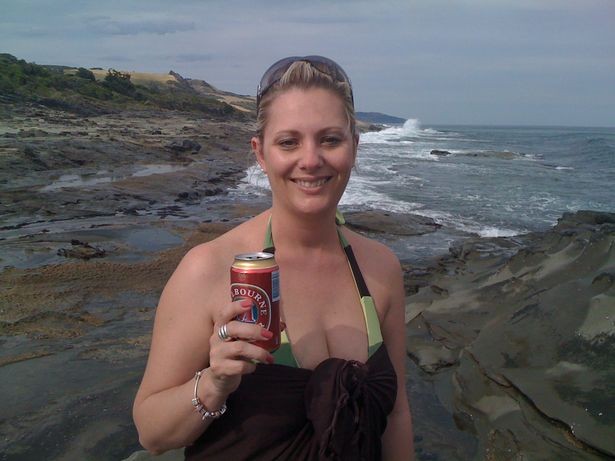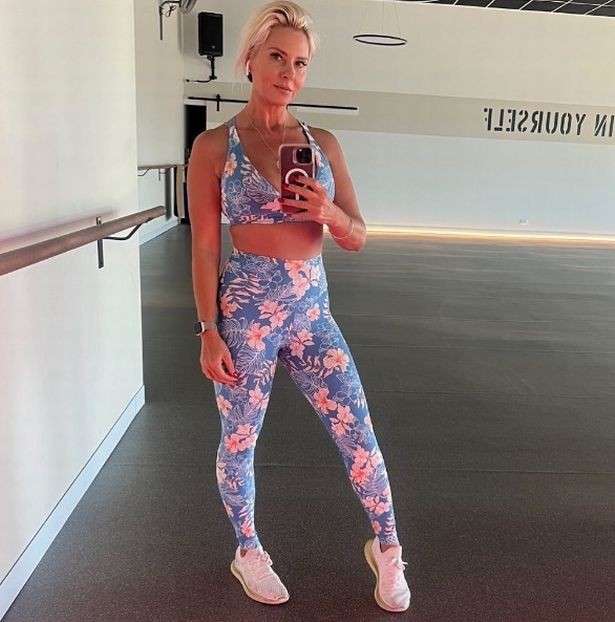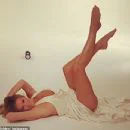Fabulous
Alcoholic 'looks better in 40s than 20s after ditching wine
A woman whose crippling addiction to alcohol nearly killed her has revealed how she finally managed to turn her life around.

Justine Whitchurch, from Gold Coast, Australia, quit alcohol nine years ago after being hospitalised with a chronic addiction that saw her hiding booze in shampoo bottles in the shower.
While she's now thriving as a personal trainer, author and mum of two, in the months leading up to her decision to quit, she would consume three bottles of wine a day with vodka shots thrown in if she wanted to go “undetected”.
Now, she speaks to those caught in the clutches of poor mental and physical health, alcoholism and addiction.
“The amount I drank was sporadic and most certainly towards the end of my ‘drinking career’ as I affectionately refer to it, it was at least two to three bottles of wine every day followed by the vodka chasers, particularly when I wanted to go undetected,” she told Daily Star.
“On the odd occasion, I even swigged on mouthwash when I was desperate for something to take the edge off.
“I always had the bottle on the table for all to see and then a couple strategically placed throughout the house for the extra top-ups where required.”
Since Justine has given up alcohol for good, she looks better in her 40s than she did in her 20s – but it took a battle with her inner demons to get here.
During the height of the disease, she was a skeleton at 7.4 stone and was barely able to hold herself upright.
She had her first drink at a party when she was 15. At the time she thought it was just your typical rebellious teenage decision, little did she know, it would change her life forever.
After her first few drinks, Justine noticed the alcohol's ability to reduce her inhibitions and allow her to be less self-conscious.

The 49-year-old learnt fairly early on that she could medicate any anxiety she was feeling with a drink.
“Albeit it something that I would not acknowledge until at least another decade, there was one incident where I believe the way I drank changed,” she explained.
“I had been on and off with a boyfriend who I was madly in love with and had a difficult time accepting the split.
“I walked to the fridge, grabbed a bottle of beer and took it back to bed with me and drank it as I sobbed myself to sleep.
“That feeling of numbness and calm was something that I would later become accustomed to dealing with anything that made me feel uncomfortable."
After this, alcohol quickly became a tool for her to manage the white noise, constant anxiety and uncertainty of life.
While Justine was in social settings she would drink a moderate amount, it was once she was behind closed doors her drinking would really ramp up.
She continued: “I felt my intake increase during a rather tumultuous separation from my first husband and subsequent shared care arrangements of small children and significant financial pressure.
“I suffered a complete loss of self during that relationship and my sense of self-worth was indicative of the little I cared about what I was doing to myself.
“Emotionally I became stunted and I became unravelled at the simplest of challenges. Physically I had become fully dependent and my body was beginning to shut down.
“My liver was showing signs of cirrhosis, platelets dangerously low, elevated triglycerides levels, my hair was falling out and at the latter part of my addiction I essentially replaced food with alcohol.”

Justine believes her alcoholism stems from a variety of factors, such as genetic predispositions, learnt and expected social behaviours and medicating her way through undiagnosed mental health conditions.
“I can’t pinpoint one particular issue that created my dependency; however, I do recognise that it crept up on me ever so quietly,” she explained.
“There were periods of time where my intake was somewhat under control but the moment something challenging came along, it was my first port of call.
Latest News
A woman whose crippling addiction to alcohol nearly killed her has revealed how she finally managed to turn her life around.

Justine Whitchurch, from Gold Coast, Australia, quit alcohol nine years ago after being hospitalised with a chronic addiction that saw her hiding booze in shampoo bottles in the shower.
While she's now thriving as a personal trainer, author and mum of two, in the months leading up to her decision to quit, she would consume three bottles of wine a day with vodka shots thrown in if she wanted to go “undetected”.
Now, she speaks to those caught in the clutches of poor mental and physical health, alcoholism and addiction.
“The amount I drank was sporadic and most certainly towards the end of my ‘drinking career’ as I affectionately refer to it, it was at least two to three bottles of wine every day followed by the vodka chasers, particularly when I wanted to go undetected,” she told Daily Star.
“On the odd occasion, I even swigged on mouthwash when I was desperate for something to take the edge off.
“I always had the bottle on the table for all to see and then a couple strategically placed throughout the house for the extra top-ups where required.”
Since Justine has given up alcohol for good, she looks better in her 40s than she did in her 20s – but it took a battle with her inner demons to get here.
During the height of the disease, she was a skeleton at 7.4 stone and was barely able to hold herself upright.
She had her first drink at a party when she was 15. At the time she thought it was just your typical rebellious teenage decision, little did she know, it would change her life forever.
After her first few drinks, Justine noticed the alcohol's ability to reduce her inhibitions and allow her to be less self-conscious.

The 49-year-old learnt fairly early on that she could medicate any anxiety she was feeling with a drink.
“Albeit it something that I would not acknowledge until at least another decade, there was one incident where I believe the way I drank changed,” she explained.
“I had been on and off with a boyfriend who I was madly in love with and had a difficult time accepting the split.
“I walked to the fridge, grabbed a bottle of beer and took it back to bed with me and drank it as I sobbed myself to sleep.
“That feeling of numbness and calm was something that I would later become accustomed to dealing with anything that made me feel uncomfortable."
After this, alcohol quickly became a tool for her to manage the white noise, constant anxiety and uncertainty of life.
While Justine was in social settings she would drink a moderate amount, it was once she was behind closed doors her drinking would really ramp up.
She continued: “I felt my intake increase during a rather tumultuous separation from my first husband and subsequent shared care arrangements of small children and significant financial pressure.
“I suffered a complete loss of self during that relationship and my sense of self-worth was indicative of the little I cared about what I was doing to myself.
“Emotionally I became stunted and I became unravelled at the simplest of challenges. Physically I had become fully dependent and my body was beginning to shut down.
“My liver was showing signs of cirrhosis, platelets dangerously low, elevated triglycerides levels, my hair was falling out and at the latter part of my addiction I essentially replaced food with alcohol.”

Justine believes her alcoholism stems from a variety of factors, such as genetic predispositions, learnt and expected social behaviours and medicating her way through undiagnosed mental health conditions.
“I can’t pinpoint one particular issue that created my dependency; however, I do recognise that it crept up on me ever so quietly,” she explained.
“There were periods of time where my intake was somewhat under control but the moment something challenging came along, it was my first port of call.

Jennifer Lopez looks ageless in a towel in no-makeup video

Amanda Holden spanks her derriere and thanks Spanx

Amanda Holden shows off more than bargained as she dances around in her outfit of the day

Meet Harley Cameron, the stunning model who went from a BKFC ring girl to become a pro wrestler and found love

GreenGirlBella, Rocks Emirates Stadium in Painted Home Kit

Amanda Holden calls herself a 'good girl' in white dress with 'cheeky' split

Mum slammed by parents after flashing thong in school run outfit

Lottie Moss makes jaws dropp as she shows off her flawless body

Amanda Holden wears nothing beneath plunging white dress












Comments
Written news comments are in no way https://www.showbizglow.com it does not reflect the opinions and thoughts of. Comments are binding on the person who wrote them.